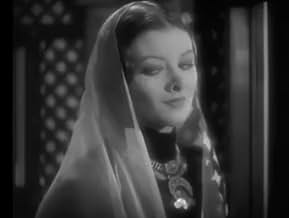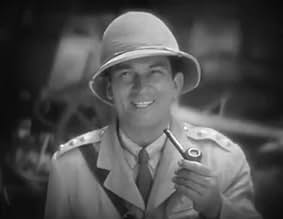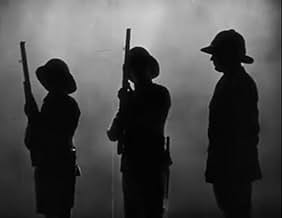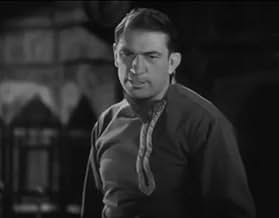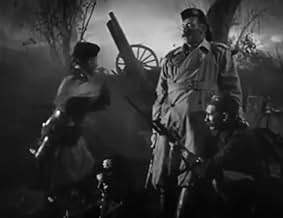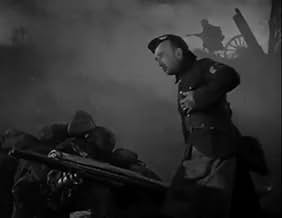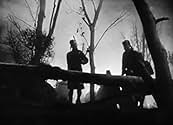AVALIAÇÃO DA IMDb
5,6/10
555
SUA AVALIAÇÃO
Adicionar um enredo no seu idiomaCaptain Donald King of the British Army goes to India just as World War I breaks out, convincing his comrades that he is a coward. In reality, he is on a secret mission to rescue British sol... Ler tudoCaptain Donald King of the British Army goes to India just as World War I breaks out, convincing his comrades that he is a coward. In reality, he is on a secret mission to rescue British soldiers held prisoner there.Captain Donald King of the British Army goes to India just as World War I breaks out, convincing his comrades that he is a coward. In reality, he is on a secret mission to rescue British soldiers held prisoner there.
- Direção
- Roteiristas
- Artistas
Claude King
- General in India
- (as Claud King)
Harry Allen
- Sandy
- (não creditado)
Frank Baker
- 42nd Highlander
- (não creditado)
William Begg
- 42nd Highlander
- (não creditado)
Arthur Clayton
- 42nd Highlander
- (não creditado)
Joseph Diskay
- Muezzin
- (não creditado)
Francis Ford
- Maj. MacGregor
- (não creditado)
Gregory Gaye
- 42nd Highlander
- (não creditado)
- Direção
- Roteiristas
- Elenco e equipe completos
- Produção, bilheteria e muito mais no IMDbPro
Avaliações em destaque
Victor McLaglen stars as Captain Donald King, a member of a Scots regiment of His Majesty's Armed Forces during WW1. While his company receives orders to ship out to the front, King is given a different assignment, He is to go undercover to India, where he will pretend to be a drunk who gets chased out of the service so that he can infiltrate a gang of Muslim rebels who worship a woman named Yasmani (Myrna Loy) as a goddess. Naturally things get further complicated when King falls for Yasmani. Also featuring Randolph Scott and John Wayne as extras.
This was director Ford's first sound movie, and it shows. For the first 45 minutes or so, I was prepared to call this one a complete turkey, just horrible in nearly every way, but by the end I thought pretty much the same thing, except it plunged into pure camp, and Ford manages to shoot some visually interesting shots when the action moves to "The Cave of the Echoes". McLaglen and Loy are awful, and you would never know from this that either would be capable of acting their way out of a paper bag.
Ford certainly hadn't grasped sound acting, and virtually everyone is terrible, drawing lines out to ludicrous length and over emoting like the worst silent film ham. Loy looks great, and she has a lengthy scene in a white, virtually see-through shirt. I was left wondering what kind of East Indian Muslims also worshiped random white ladies as goddesses, but that train of thought led nowhere. The fiery, shadowy Cave interiors are atmospheric, and the scene where McLaglen is "forced" to wrestle the Muslim champion is amusing, as I would think it was harder to stop Victor McLaglen from wrestling random guys on the set every day. 5/10 on its merit as a dramatic film, 7/10 on a so good it's bad scale, I split the difference.
This was director Ford's first sound movie, and it shows. For the first 45 minutes or so, I was prepared to call this one a complete turkey, just horrible in nearly every way, but by the end I thought pretty much the same thing, except it plunged into pure camp, and Ford manages to shoot some visually interesting shots when the action moves to "The Cave of the Echoes". McLaglen and Loy are awful, and you would never know from this that either would be capable of acting their way out of a paper bag.
Ford certainly hadn't grasped sound acting, and virtually everyone is terrible, drawing lines out to ludicrous length and over emoting like the worst silent film ham. Loy looks great, and she has a lengthy scene in a white, virtually see-through shirt. I was left wondering what kind of East Indian Muslims also worshiped random white ladies as goddesses, but that train of thought led nowhere. The fiery, shadowy Cave interiors are atmospheric, and the scene where McLaglen is "forced" to wrestle the Muslim champion is amusing, as I would think it was harder to stop Victor McLaglen from wrestling random guys on the set every day. 5/10 on its merit as a dramatic film, 7/10 on a so good it's bad scale, I split the difference.
Released in 1929, THE BLACK WATCH is an entertaining flick shot in black & white, and John Ford's first all-talkie film. It's based on the 1916 novel 'King of the Khyber Rifles' by Talbot Mundy.
Captain Donald King (McLaglen) goes undercover and leaves his regiment (Black Watch) to put down a rebellion in India at the at the start of WWI. There he finds the beautiful princess Yasmani (Loy) who plans to send her minions to attack British forces at the Khyber Pass.
As we would expect from a Ford movie it has a good look, especially the outdoor scenes. The Cave of Echoes scenes are well crafted with fine visuals and sound effects.
The problem the movie has is it's dialogue in many scenes, Myrna Loy's in particular, is stilted and stagy , as if they thought the mics couldn't keep up with their voices. Still, a good movie.
Captain Donald King (McLaglen) goes undercover and leaves his regiment (Black Watch) to put down a rebellion in India at the at the start of WWI. There he finds the beautiful princess Yasmani (Loy) who plans to send her minions to attack British forces at the Khyber Pass.
As we would expect from a Ford movie it has a good look, especially the outdoor scenes. The Cave of Echoes scenes are well crafted with fine visuals and sound effects.
The problem the movie has is it's dialogue in many scenes, Myrna Loy's in particular, is stilted and stagy , as if they thought the mics couldn't keep up with their voices. Still, a good movie.
John Ford is in my opinion the greatest director that ever lived, and he rarely ever made a misstep. Many people have listed The Black Watch as a misstep, but in context I do not think that it is. It is true that it is dated in the way that the dialogue is spoken, but find me one sound picture from 1929 that is not.
The problem was with sound pictures themselves, the movies had developed into near perfection in 1927-1928. But then sound became all the rage, and it wasn't profitable anymore for the studios to invest in silent movies. So the masterpieces of the late silent era were put on the back burner for stagy dramas with too much dialog or musicals even more stagy than the dramas.
The Black Watch has Ford's German expressionism influenced photography that he started in the late twenties after meeting F.W. Murnau. It also has the Ford themes of Integration into a society, self sacrifice, and the bond between men.
The one major drawback is the extremely stilted dialogue. No one really understood at the time how sound should be recorded live, which led to really irregular ways of saying lines. With long pauses between each others lines, since they did not want to step on each others' lines, so as to overwork the early microphones.
Victor McLaughlin's acting wasn't his best, but he was much better than Myrna Loy who honestly seemed as though she had been hypnotized before going on the set. I thought the guy who asked forforgiveness for his violence towards his fellow man, who would then do something violent was funny.
Compared to all of John Ford's other films this is near the bottom, but compared to everything else made in sound in 1929 this is at the top of the heap.
The problem was with sound pictures themselves, the movies had developed into near perfection in 1927-1928. But then sound became all the rage, and it wasn't profitable anymore for the studios to invest in silent movies. So the masterpieces of the late silent era were put on the back burner for stagy dramas with too much dialog or musicals even more stagy than the dramas.
The Black Watch has Ford's German expressionism influenced photography that he started in the late twenties after meeting F.W. Murnau. It also has the Ford themes of Integration into a society, self sacrifice, and the bond between men.
The one major drawback is the extremely stilted dialogue. No one really understood at the time how sound should be recorded live, which led to really irregular ways of saying lines. With long pauses between each others lines, since they did not want to step on each others' lines, so as to overwork the early microphones.
Victor McLaughlin's acting wasn't his best, but he was much better than Myrna Loy who honestly seemed as though she had been hypnotized before going on the set. I thought the guy who asked forforgiveness for his violence towards his fellow man, who would then do something violent was funny.
Compared to all of John Ford's other films this is near the bottom, but compared to everything else made in sound in 1929 this is at the top of the heap.
John Ford had notched up almost 50 films in the director's chair when he took on this project in the late 20's coinciding with the advent of sound.
Far less well known than its 1953 re-make (known AS KING OF THE KHYBER RIFLES) with Tyrone Power in the Victor McLlaglen role, the story is that of British Army Officer Captain King, who encounters way more than he expected when he is asked to put down an Indian rebellion up around the Khyber Pass.
Very dated now and without the benefit of wide screen color which so enhances desert dramas especially, BLACK WATCH is still an interesting time-capsule. I saw it many years ago on late night TV, both to compare with the later version and to see how John Ford's direction held up in 1929. On both counts, the film scored well!
Far less well known than its 1953 re-make (known AS KING OF THE KHYBER RIFLES) with Tyrone Power in the Victor McLlaglen role, the story is that of British Army Officer Captain King, who encounters way more than he expected when he is asked to put down an Indian rebellion up around the Khyber Pass.
Very dated now and without the benefit of wide screen color which so enhances desert dramas especially, BLACK WATCH is still an interesting time-capsule. I saw it many years ago on late night TV, both to compare with the later version and to see how John Ford's direction held up in 1929. On both counts, the film scored well!
I find the birth of sound to be the most fascinating point in movie history. Things like widescreen cinematography and color eventually ended up dominating cinema after their introduction, but those were slow and gradual processes. Simplified, movies went from silent in 1928 to sound in 1929. It was a sea change and it happened all at once. John Ford had included some sound in a couple of previous silent films (notably Riley the Cop), and his first full talkie, a short film called Napoleon's Barber, is lost. That leaves The Black Watch as his first feature length talkie, and it's obvious that even a practiced hand like Ford was lost in this strange new world. The new technology and its inherent limitations didn't kill the film completely, but they killed parts of it for sure.
The film starts in England at a dinner for a Scottish regiment, the titular Black Watch, on the eve of their departure for France at the beginning of World War I. The field marshal (David Torrence) sends word that Captain King (Victor McLaglen) should report at once. In the earliest sign that the film has done sound all wrong, the field marshal very slowly explains the situation in India that he needs King to go and help solve. The dialogue is told in small chunks (think William Shatner when he struggled to remember his lines, but worse) with massive airs. For what essentially amounts to an exposition dump, this is painful to listen to.
From what I've read, Ford had no idea how to direct with sound. I mean, who did? It was brand new. He went with what he knew, though, and he seems to have been whispering the lines to his actors. They seem to be hearing half a sentence of dialogue from their director, speaking it, and then waiting another couple of seconds for another line. It's stilted, unnatural, and honestly hard to listen to. I don't demand realism all the time from movies, but this is the kind of unrealism that is a distraction with no narrative or cinematic purpose. If this were limited to this particular scene, it would be of limited concern. However, it's most dialogue scenes (not all), and, most damagingly, in every scene that Myrna Loy is in.
Alright, so the mission King is on is to infiltrate the army of hill people led by the mysterious female figure, held up like a goddess amongst her followers, Yasmani (Loy). King was selected because he grew up in the area while his father was stationed there, and he knows the local languages (which he never speaks, of course). He quickly meets up with an Indian officer, Mohammed Khan (Mitchell Lewis), whom King knows from his youth, and they concoct a plan with the local English officers. King is to look like he drunkenly kills a fellow officer and goes on the run, hopefully welcomed into the open arms of Yasmani.
It works, and then we get the dialogue completely undermining everything. When you have really quick and deeply felt romances in film, you have to really sell it to the audience. This is the mystical "chemistry" that pairs like Bogart and Bacall had in To Have and Have Not. I could not begin to tell you if McLaglen and Loy had chemistry, though, because literally every single line of dialogue between them is fed to them by Ford. It's two actors, taking breaths between every half line of dialogue, and speaking with great import. It becomes outright silly after a while, and it prevents any kind of emotional engagement with the scene.
The movie's not worthless, though. There are small dialogue scenes that are fine (like when King and the officer he was to have killed explain the situation to each other), and the film is often simply great to look at. It was very common in the early days of sound to not film everything with sound. You filmed with silent cameras a lot, preserving the freedom of motion and framing that you no longer got from needing to work inside a glass box. There's a particular shot, showing the Black Watch marching down a dark road in Flanders, that's absolutely gorgeous. There's also a moment where Yasmani shows the Black Watch to King through a crystal ball, and the framing is perfect so that King's younger brother fills the bottom left of the frame while King fills the top right.
The adventure elements are also fairly solid with an ending that actually engages with the situation seriously enough to be believable and has some pretty good action beats. The stuff about men dying on the battlefields of World War I in France is earnestly presented even if it ends up feeling like extra material not entirely necessary for the film.
So, the performances are largely awful (Ford's fault), but it's otherwise a thinly engaging adventure film that often looks great. This is kind of what I expected from an established director's first talkie. There's craft still there, but Ford was well within the learning curve of the new technology in a way that made the film hard to watch at times. Still, I've seen worse.
The film starts in England at a dinner for a Scottish regiment, the titular Black Watch, on the eve of their departure for France at the beginning of World War I. The field marshal (David Torrence) sends word that Captain King (Victor McLaglen) should report at once. In the earliest sign that the film has done sound all wrong, the field marshal very slowly explains the situation in India that he needs King to go and help solve. The dialogue is told in small chunks (think William Shatner when he struggled to remember his lines, but worse) with massive airs. For what essentially amounts to an exposition dump, this is painful to listen to.
From what I've read, Ford had no idea how to direct with sound. I mean, who did? It was brand new. He went with what he knew, though, and he seems to have been whispering the lines to his actors. They seem to be hearing half a sentence of dialogue from their director, speaking it, and then waiting another couple of seconds for another line. It's stilted, unnatural, and honestly hard to listen to. I don't demand realism all the time from movies, but this is the kind of unrealism that is a distraction with no narrative or cinematic purpose. If this were limited to this particular scene, it would be of limited concern. However, it's most dialogue scenes (not all), and, most damagingly, in every scene that Myrna Loy is in.
Alright, so the mission King is on is to infiltrate the army of hill people led by the mysterious female figure, held up like a goddess amongst her followers, Yasmani (Loy). King was selected because he grew up in the area while his father was stationed there, and he knows the local languages (which he never speaks, of course). He quickly meets up with an Indian officer, Mohammed Khan (Mitchell Lewis), whom King knows from his youth, and they concoct a plan with the local English officers. King is to look like he drunkenly kills a fellow officer and goes on the run, hopefully welcomed into the open arms of Yasmani.
It works, and then we get the dialogue completely undermining everything. When you have really quick and deeply felt romances in film, you have to really sell it to the audience. This is the mystical "chemistry" that pairs like Bogart and Bacall had in To Have and Have Not. I could not begin to tell you if McLaglen and Loy had chemistry, though, because literally every single line of dialogue between them is fed to them by Ford. It's two actors, taking breaths between every half line of dialogue, and speaking with great import. It becomes outright silly after a while, and it prevents any kind of emotional engagement with the scene.
The movie's not worthless, though. There are small dialogue scenes that are fine (like when King and the officer he was to have killed explain the situation to each other), and the film is often simply great to look at. It was very common in the early days of sound to not film everything with sound. You filmed with silent cameras a lot, preserving the freedom of motion and framing that you no longer got from needing to work inside a glass box. There's a particular shot, showing the Black Watch marching down a dark road in Flanders, that's absolutely gorgeous. There's also a moment where Yasmani shows the Black Watch to King through a crystal ball, and the framing is perfect so that King's younger brother fills the bottom left of the frame while King fills the top right.
The adventure elements are also fairly solid with an ending that actually engages with the situation seriously enough to be believable and has some pretty good action beats. The stuff about men dying on the battlefields of World War I in France is earnestly presented even if it ends up feeling like extra material not entirely necessary for the film.
So, the performances are largely awful (Ford's fault), but it's otherwise a thinly engaging adventure film that often looks great. This is kind of what I expected from an established director's first talkie. There's craft still there, but Ford was well within the learning curve of the new technology in a way that made the film hard to watch at times. Still, I've seen worse.
Você sabia?
- CuriosidadesThis was the first sound feature that John Ford directed. Unable to shout orders to the actors, he had his brother, First Assistant Edward O'Fearna dress up as a rifleman and mingle with the crowd whispering Ford's instructions to the principal actors.
- Citações
General in India: Forget your schoolboy scruples. This is war.
Principais escolhas
Faça login para avaliar e ver a lista de recomendações personalizadas
- How long is The Black Watch?Fornecido pela Alexa
Detalhes
Bilheteria
- Orçamento
- US$ 400.000 (estimativa)
- Tempo de duração
- 1 h 33 min(93 min)
- Cor
Contribua para esta página
Sugerir uma alteração ou adicionar conteúdo ausente

